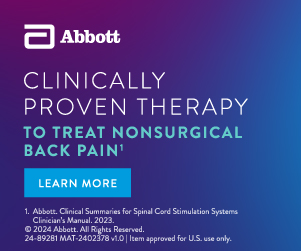AANS Neurosurgeon Newsline
225 POSTS 0 COMMENTS
AANS Neurosurgeon is the official socioeconomic publication of the American Association of Neurological Surgeons (AANS) and features information and analysis for contemporary neurosurgical practice. Published monthly online, AANS Neurosurgeon focuses on issues related to neurosurgery legislation, the workforce and practice management. Researchers with the Johns Hopkins Kimmel Cancer Center, the Johns Hopkins University School of Medicine and four other institutions have developed a molecular test to identify the presence of brain tumors by measuring abnormal genetic material shed by tumors and circulating in cerebrospinal fluid (CSF). A description of the work was published Aug. 15 in the journal Cell Reports Medicine. Typically, brain tumors are assessed through...
The following statement is issued on behalf of the American Academy of Neurological Surgery, American Association of Neurological Surgeons, American Board of Neurological Surgery, Congress of Neurological Surgeons and Society of Neurological Surgeons on behalf of our neurosurgical colleagues and the global society we are privileged to serve: As neurosurgical professional organizations, we are shocked and saddened by the events...
A new study from the University of Chicago Medicine reveals that nearly 75 percent of acute stroke patients wait more than two hours to be transferred to a comprehensive stroke center — a delay in advanced care and treatments that risks long-term disability. “In neurology, we often say that "time is brain." For every 15 minutes that pass without treatment, prior research...
A first-in-human trial of deep brain stimulation (DBS) for post-stroke rehabilitation patients by Cleveland Clinic researchers has shown that using DBS to target the dentate nucleus – which regulates fine-control of voluntary movements, cognition, language, and sensory functions in the brain – is safe and feasible. The EDEN trial (Electrical Stimulation of the Dentate Nucleus for Upper Extremity Hemiparesis Due to Ischemic...
Gliomas are incurable brain tumors. Researchers are trying to unlock the mysteries of how they originate from normal cells, which may lead to better treatments. A new study published in the journal Cell centers on epigenetic rather than genetic changes that drive normal cells to form tumors.The work reveals the precise genes that are regulated epigenetically and lead to cancer. Genes make us...
For the first time, researchers have found a potential drug candidate that improved outcomes for patients with a type of childhood brain tumor for which there are no effective treatments. The compound, called ONC201, nearly doubled survival for patients with diffuse midline glioma (DMG) or diffuse intrinsic pontine glioma (DIPG), compared to previous patients. The findings are reported by an international team...
Newsline
First-of-its-Kind Open-Analysis Platform for Pediatric Brain Tumors Provides Robust Data Resource for Childhood Cancer Research
Researchers from Children’s Hospital of Philadelphia (CHOP), the Alex’s Lemonade Stand Foundation Childhood Cancer Data Lab, the Children’s Brain Tumor Network (CBTN), the Pacific Pediatric Neuro-Oncology Consortium (PNOC), and more than 20 additional institutions have partnered to create a first-of-its-kind open-source, reproducible analysis platform for pediatric brain tumors. With the help of thousands of genomically sequenced samples, researchers have used this platform to identify initial...
In an international study co-led by UCLA, scientists have shown that a new targeted therapy drug can extend the amount of time people with a subtype of glioma are on treatment without their cancer worsening. The finding suggests a possible new treatment option for people with the slow-growing but deadly brain tumor. The team found the drug vorasidenib more than doubled...
Newsline
Study Finds Disease Progression and Adverse Radiation Effects Are Low in Patients Undergoing Preoperative Stereotactic Radiosurgery
Cancer that spreads to the brain from another part of the body such as lung or breast is called a metastatic brain tumor. As metastatic brain tumors grow, they can cause symptoms such as headaches, seizures and weakness or balance issues. In some patients, surgery and stereotactic radiosurgery (SRS) can help alleviate these symptoms in patients who have a...
In a recently published manuscript, Howard Colman, MD, PhD, Jon M. Huntsman Presidential Professor of Neuro-Oncology and co-leader of the Neurologic Cancers Disease Center and the Experimental Therapeutics CCSG program at Huntsman Cancer Institute, identified a potential breakthrough in glioblastoma treatment. Glioblastoma, or GBM, is an aggressive type of brain cancer. According to Colman, this is the most common type of cancerous...





